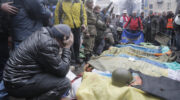Responsibility Europe
Russia’s nuclear saber rattling: A threat or wake-up call for the West?
| View caption Hide caption
Threats would appear to signal conflict. But the Kremlin’s nuclear diplomacy, seen by the West as risking escalation, is categorized as a longer-term strategy of deterrence in Russia.
Tensions have been rising in the East-West confrontation for several years, even as the diplomatic guardrails have fallen away. But experts say Russia’s increasingly intense nuclear saber rattling in recent months is less a call to confrontation than a wake-up call about the need to restore deterrence.
The Kremlin is deeply frustrated with Washington’s support for Ukraine, which includes not only arms and funding but also, Russian analysts contend, direct and escalating U.S. involvement in planning military operations, from target selection to assassinations. They argue that such U.S. involvement amounts to a proxy war against Russia, ignoring all Moscow’s “red lines.” Mr. Putin’s nuclear diplomacy, analysts say, may be a way to express distress while suggesting to U.S. officials that they may be courting nuclear war.
“The point of all these signals is to move the U.S. elite out of its comfort zone, this belief that they can wage hybrid war against Russia without facing any real consequences,” says Dmitry Suslov, a leading foreign policy expert with the Higher School of Economics in Moscow. “It’s clear from listening to things American leaders say, such as ‘supporting Ukraine is a good investment because Russians are getting killed and Americans aren’t,’ that they feel it’s a safe course of action. It is not safe. There is an escalatory ladder here, and very dangerous consequences are looming.”
View caption Hide caption
The new context
Mr. Suslov says that Russia has been signaling its concern for some time, suspending its compliance with the nuclear START accord earlier this year, for example, forward-deploying Russian nuclear weapons to neighboring Belarus, withdrawing from the test ban treaty, and running increasingly aggressive nuclear drills.
“So far these are just words, messages, warnings, but that can change,” Mr. Suslov says. “We need to reestablish fear, make the U.S. afraid that it can happen. Russia believes that when the U.S. elite realizes that the danger of nuclear war is real – as was the case during the Cuban missile crisis – they will reconsider their policies.”
Russia has so far refrained from any step that would irrevocably change the status quo. Dropping ratification of the test ban treaty merely puts it on a par with the U.S., which never ratified the accord. Mr. Putin has said that Russia will not resume testing of nuclear weapons as long as the U.S. doesn’t start.
But in the present atmosphere, the Russian move sharply escalates tensions, says Vladimir Dvorkin, a military expert at the official Institute of World Economy and International Relations, a research university in Moscow.
“As a single action, this would not have caused any danger of using nuclear weapons, but it became another step in a chain of successive events and statements in Russia and the U.S. in conditions of fierce competition,” he says. “According to many politicians and experts, the threat of nuclear war is significantly increasing. This is facilitated by radical experts and new politicians, who advocate the actual use of tactical nuclear weapons.”
View caption Hide caption
The argument for demonstratively detonating a nuclear weapon, perhaps in Ukraine or even Europe, was made explicitly last June by Sergei Karaganov, a top Russian strategic thinker, who published a profoundly controversial article suggesting Moscow should launch such a “pre-emptive nuclear strike.” The idea has sparked surprisingly little public conversation, but it has led to a sharp debate among strategic experts in Russia as well as in the West.
President Putin himself, however, does not appear convinced. At a security conference last month, he reminded Mr. Karaganov that Russia’s existing nuclear doctrine envisages the use of atomic weapons in only two instances – if another power has launched a nuclear attack on Russia, or if the existence of the Russian state is threatened by a conventional attack.
“Do we need to change this? Why would we?” said Mr. Putin. “There is no situation imaginable today where something would threaten Russian statehood and the existence of the Russian state. I do not think anyone in their right mind would consider using nuclear weapons against Russia.”
The risks of escalation
Mr. Karaganov’s thesis reflects Russian frustration at the long, costly, and painful ordeal of the Ukraine war, which they blame on the massive backing Ukraine has received from the united West. But critics warn that actually using a nuclear weapon, even if in a limited demonstration, risks an unpredictable response from the U.S., while probably losing Russia such sympathy and support as it has managed to garner from some countries of the Global South.
Even if the Ukraine war ends, global strategic stability is unlikely to be restored, analysts warn. The U.S. has sent signals to Moscow suggesting a limited resumption of talks on how to contain the dangers of nuclear war, or an accidental conflagration, but Russia has not reacted, says Fyodor Lukyanov, editor of Russia in Global Affairs, a leading Moscow-based foreign policy journal.
“I suppose this is not an acceptable approach for Russia,” he says. “Russia’s position is, let’s first address the serious problems that are causing discord, such as the war in Ukraine, security zones, NATO expansion, etc., and then pass on to the issue of strategic stability.”
Meanwhile, as the Ukraine war grinds on, the temperature continues to rise.
“Even now the U.S. continues to be against any possible peace negotiations, and sends ever more sophisticated weapons to Ukraine,” says Mr. Suslov. “We have sanctions that will never be repealed, U.S. pressure against us all around the world. And it will keep going on. That’s why, in the opinion of many in the Russian leadership and expert community, Karaganov’s logic is sound, even if his method would be counterproductive.”




